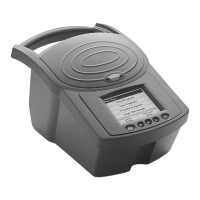Introduction
5940022Intro.fm Page 13
Section 1 Introduction
1.1 Abbreviations Used in this Manual
The following abbreviations are used throughout the text of the
procedure section:
Table 1
Abbreviation Definition Abbreviation Definition
°C degree(s) Celsius (Centigrade) HR high range
°F degree(s) Fahrenheit L
liter—volume equal to one cubic decimeter
(dm
3
)
ACS
American Chemical Society reagent grade
purity
LR low range
APHA
Standard
Methods
Standard Methods for the Examination of
Water and Wastewater, published jointly by the
American Public Health Association (APHA),
the American Water Works Association
(AWWA), and the Water Environment
Federation (WEF), is the standard reference
work for water analysis. Order from Hach
requesting Cat. No. 22708-00, or from the
Publication Office of the APHA. Many
procedures contained in this manual are
based on Standard Methods.
MDL method detection limit
MDB marked dropping bottle
mg/L milligrams per liter (ppm)
µg/L micrograms per liter (ppb)
mL
milliliter—1/1000 of a liter. It is approximately
the same as a cubic centimeter (and is
sometimes called a “cc”).
MR medium range
AV AccuVac
®
NIPDWR
National Interim Primary Drinking Water
Regulations
Bicn bicinchoninate NPDES
National Pollutant Discharge Elimination
System
conc concentrated P phosphorus
DB dropping bottle PCB poly chlorinated biphenyl
DBP disinfection by-products ppb parts per billion
CFR Code of Federal Regulations ppm parts per million
EDL Estimated detection limit RL Rapid Liquid™
EPA Environmental Protection Agency SCDB self-contained dropping bottle
F&T free and total THM trihalomethane
FM FerroMo
®
TNT Test ‘N Tube™
FV FerroVer
®
TOC total organic carbon
FZ FerroZine
®
TPH total petroleum hydrocarbons
g grams TPTZ 2,4,6-Tri-(2-Pyridyl)-1,3,5-Triazine
gr/gal grains per gallon (1 gr/gal = 17.12 mg/L) USEPA
United States Environmental
Protection Agency
ULR ultra low range

